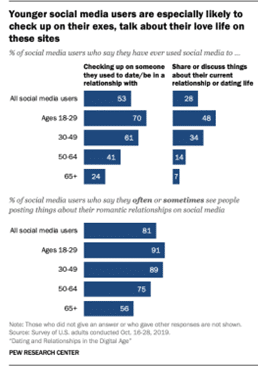Rochelle’s experience was no different. When Rochelle started dating Aron, they decided to keep it under wraps since they worked in the same office and office romances were frowned upon. She also noticed another colleague, Archie getting in constant fights with Aron, which Aron dismissed as jealousy. At a party, Rochelle found a drunk Archie telling her that Aron had been dating her too. And, just like Rochelle, Aron had told Archie to keep it under wraps. However, I too exercised extreme secrecy when I was dating my husband since my father didn’t approve of him. But, it worked for me. So, how does one decide if pocketing can be toxic? Dr. Aman Bhonsle (Ph.D., PGDTA), who specializes in relationship counseling and Rational Emotive Behavior Therapy, helps us understand.
What Is A Pocketing Relationship?
A pocketing relationship is one where one partner demands complete secrecy about their relationship. The term pocketing, meaning to keep one in a metaphorical pocket, is catching eyes these days on the Internet. But, you need to be conscious of all factors before you start to think, “Is my boyfriend pocketing me?” Dr. Bhonsle says that it’s not always a bad sign if your significant other is not very forthcoming about your relationship. He says, “It doesn’t always come from a place of vindictiveness, it can come from a place of fear, where they don’t want to make too much noise.” However, pocketing can be toxic if your partner’s intentions are apathetic. You need to look out for the following signs to determine if your SO has pocketed you:
1. Frigidity in public
Does your partner frown upon PDA? Dr. Bhonsle says, “A major sign that you’re in a pocketing relationship is that your partner becomes extremely dispassionate in public.” They would become frigid enough to ignore you if you run into someone they know. They never introduce you to them. When you ask about these people, they’ll deflect and avoid telling you who they are.
2. Lack of acknowledgment on social media
Though posting online about their love lives may not be everyone’s idea of commitment, for most youngsters, it’s an important yardstick for assessing the health and seriousness of a relationship. Research suggests that people from ages 18-29 are most likely to use social media to exhibit their love lives. They are also more likely to judge their relationships based on what they see on social media. If your partner belongs to this age group or is pretty active on social media yet doesn’t post about you, then they’ve definitely pocketed you.
3. Vows of secrecy
Dr. Bhonsle says, “Another way one would pocket a relationship is by asking their partner to pretend not to be in the relationship.” Your partner could cite reasons such as a judgemental family or complicated friendships and would try to make you a party to the secret, as in the case of Rochelle.
4. Separation from friends and family
While social media is a very subjective indicator, you should consider if your partner includes you in their social circle. Notice if they avoid talking about their family or friends or making any plans to introduce you to them. However, meeting family is usually indicative of a serious relationship with a substantial degree of commitment or at least the intent to commit. So, do not go on a shopping spree to find gifts for your partner’s parents, assuming they want to you meet them just after 3 weeks of dating.
How Does Pocketing Work In Dating?
A pocketing relationship or secret relationship often has a negative connotation. After all, why would someone hide his relationship or not own up to her partner in public if she/he loves you? But, things are often more complicated than that. It makes sense to keep things under wraps if the relationship is still in its early stages but not if both of you acknowledge your feelings for each other. So, if you’re wondering, “Why is my boyfriend pocketing me?” or “Why doesn’t my girlfriend want to make things official?”, then you need to consider the following reasons:
1. They’re seeing someone else
“Is my husband pocketing me?” “Why does my wife/girlfriend want to keep the relationship a secret?” “Why does my partner shy away from embracing our relationship in public?” If such questions have been weighing on your mind, there is a chance that you may not be the only one in your SO’s life. People dating multiple partners or those who are still in touch with their exes are most likely to hide you if they don’t want their other prospects to know about you. This is also a sign you are in a rebound relationship. Dr. Bhonsle also says, “If you’re two-timing someone, you would want to leave as little footprint as possible, you’d want your whereabouts to be untraceable. So, always look for those cues before making a judgment.” Notice if your partner is being excessively secretive, if they insist on meeting only at your apartment, if they’re obsessive about things like their device locations, or if they mock or patronize your romantic needs. People in pocketing relationships go to extreme lengths to avoid you getting anywhere near their environment.
2. Why would someone hide his relationship? Fear of judgment and bias
Dr. Bhonsle suggests, “Being very selective about social media may actually be a wise strategy if you’d like to avoid the cultural and social bias. People may also favor pocketing relationships due to inherent jealousy within the same social circle, as seen mostly in teenage romances. Or in office romances where a consensual love in the workplace could affect your work image or call for an HR intervention” This would sound familiar to Euphoria fans, who would remember the Maddie-Nate-Cassie triangle. He adds, “People have all sorts of cliches and stereotypes they subscribe to and use to put you in a box. Some people don’t want the scrutiny of their families, especially on social media where everyone is trying to play amateur detectives.” “For example, if someone in their earlier sixties finds love, they may fear that people might judge them”, he explains. This could also be the reason if your partner is not comfortable showing their sexual orientation to everyone. Especially if their family is conservative and may not support your relationship.
3. They have an unsavory background
They might have a judgmental family or friends who they fear might have a negative impact on your relationship. Socio-economic differences between partners could also create a need for a pocketing relationship. This is also true if they don’t have a stereotypical-normal family like a father who is part of the Yakuza, or an uncle who has been to jail. It may appear an insignificant detail to you but they may be ashamed of their families and fear your judgment.
4. Traumatic past experiences
Your partner could have been in a bad relationship before and doesn’t want to acknowledge the relationship before they feel completely secure. This may seem unfair to you if you love them but the trauma of sexual abuse brings a lifetime of intimacy issues. You need to look for signs of trauma like emotional triggers, anxiety or self-destructive behavior to be sure of this.
5. Security reasons
If your partner is from an ultra-rich family or has security concerns, then they would want you to be out of view from anyone who might want to use you to harm them. This is a major reason why many celebrities don’t disclose their relationships on social media. So, if you’re wondering “Why is my husband pocketing me?”, do consider if the nature of his job or his background could be the reason behind it.
6. They find it thrilling
Many people get into a pocketing relationship for the thrill of the secrecy, though Dr. Bhonsle says, “It’s only in a very young age group for whom being in a relationship is a new concept, it’s sort of a rite of passage to adult life.” It may also be a reason if your relationship is still new and they’re unsure in the relationship.
5 Ways Pocketing Harms Your Relationship
An important thing to realize is that pocketing, meaning hiding a significant other from one’s public life, is different from a private relationship in many ways. Many people hide their relationships to protect their partners from harmful scrutiny. So, when does pocketing begin to harm a relationship? Here are 5 telling indicators that the secrecy of your relationship has chartered into unhealthy territory:
1. Impact on mental well-being
Research suggests that increased secrecy about one’s relationship could be linked to lower commitment to the relationship and low self-esteem. This was further linked to the poor health and mental well-being of the partner in the relationship. This study proved that a pocketing relationship could lead to symptoms like nervousness and fear and hence is considered detrimental to the health of the people involved, especially the one who is being hidden away.
2. Disrespect due to anonymity
Many people may find the anonymity in a pocketing relationship disrespectful as they may feel that their partner is ashamed of them. In certain cultures, a lack of recognition of one’s partner in public is also considered dishonorable. This may lead to insecurity issues.
3. Pocketing can be toxic
With the advent of social media, the expectation to share one’s romantic details online has become common. Many people see this as an acknowledgment of one’s interest in the relationship. This lack of acknowledgment on social media can affect your relationship as it may create insecurity issues. However, Dr. Bhonsle warns against this, “Posting on social media is a personal choice. Not everyone may want to advertise their relationships, so you must always look for other cues as well.”
4. Lack of social support
Partners in a pocketing relationship may not find the required social support if things don’t work out between them. Many do not even look for support fearing contempt for being in such a relationship. In such cases, it may get difficult to find emotional support after parting ways.
5. Deception and relational costs
Research has suggested that secrecy about relationships may benefit newer couples but in the long-term, harms a couple’s connection. However, in this case, researchers also noticed an interesting complication in secret relationships, i.e. relational cost. Having a secret affair can be costly as you need access to locations that provide privacy. This extra cost could begin to appear burdensome to the relationship. To overcome insecurity developed in a pocketing relationship, Dr. Bhonsle insists on active communication. He says, “There has to be communication between partners about the parameters that one needs in the relationship to feel loved and acknowledged. These parameters are extremely subjective and may or may not include things like public acknowledgment or social media posting.” “If your partner is being extremely secretive, like not introducing you to their friends or family, and you feel like you can’t take it anymore, then it’s best to have a conversation about your need for acknowledgment in their lives,” says Dr. Bhonsle. If they get defensive and can’t validate your concern, then maybe it’s time to reconsider your relationship. If being pocketed has left you feeling confused and you’re looking for some guidance, skilled and licensed counselors on Bonobology’s panel are here to help. Because no one should lose their sleep wondering “Why would someone hide his relationship?” or “Why doesn’t she want to own our relationship?”



